Discover 29 stunning butterfly species found in the United States. Learn how to identify them, their unique features, and fascinating facts about their life cycles and habitats.
Butterflies are some of the most beautiful and fascinating creatures on our planet. With their vibrant colors, delicate wings, and graceful flight, they have captivated people for centuries. If you’re a nature lover or just someone who appreciates the beauty of these winged wonders, you’ll be delighted to know that the United States is home to a wide variety of butterfly species.
In this article, we’ll explore 29 types of butterflies that you might encounter in different parts of the country. We’ll provide detailed descriptions and tips on how to identify them, as well as interesting facts about their life cycles, habitats, and behaviors.
1. Monarch Butterfly
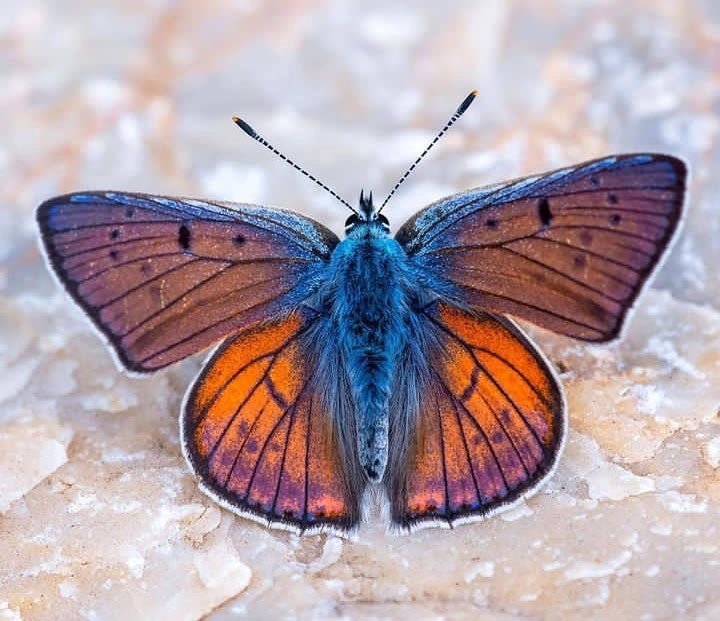
The Monarch butterfly is perhaps the most well-known and iconic butterfly species in North America. With its striking orange and black wings, it’s hard to miss this beautiful creature. Monarchs are famous for their incredible migration, traveling thousands of miles from the United States and Canada to their overwintering grounds in Mexico.
Identification
Monarchs have bright orange wings with black veins and white spots along the edges. The underside of their wings is pale brown.
Fun Fact
Monarchs use the sun to orient themselves during their migration, and they can travel up to 3,000 miles!
2. Painted Lady

The Painted Lady is a medium-sized butterfly that can be found across the United States and around the world. Its name comes from the beautiful patterns on its wings, which resemble delicate brush strokes.
Identification
Painted Ladies have orange and black wings with white spots near the tips. The underside of their wings is a mottled brown color.
Fun Fact
These butterflies are known for their incredible migration abilities, sometimes traveling thousands of miles across oceans and continents.
3. Swallowtail Butterflies
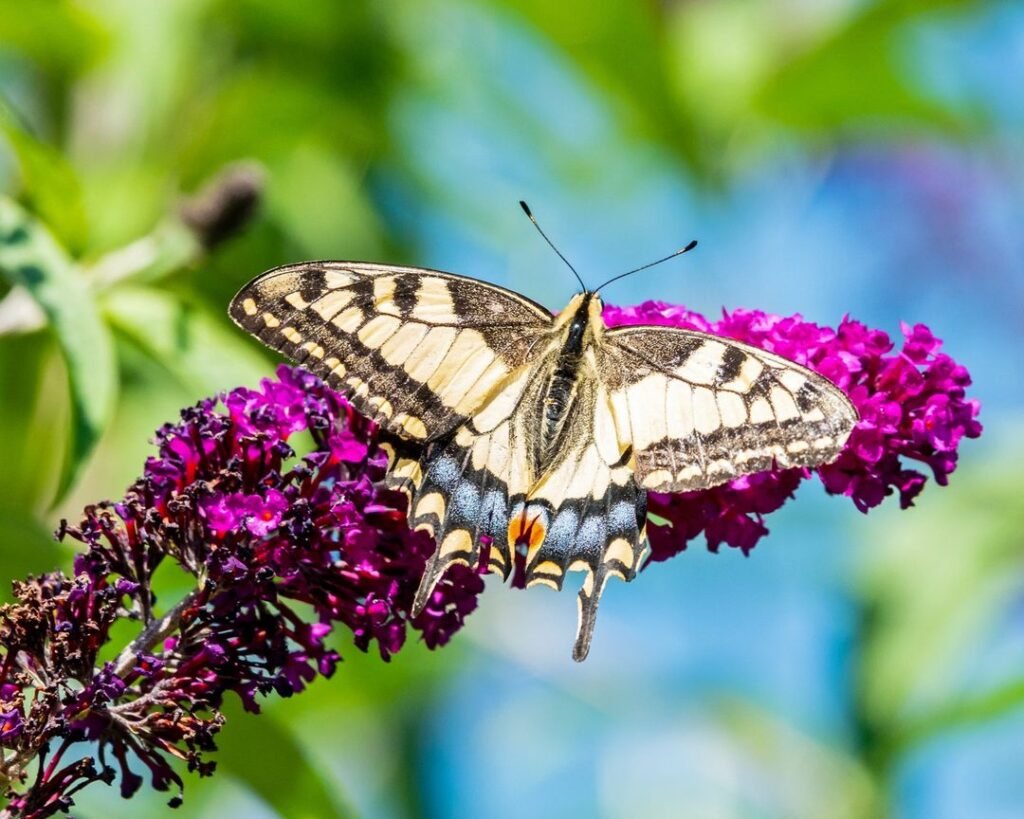
Swallowtail butterflies are a group of large, vibrant butterflies that are easily recognizable by their distinctive tails on their hindwings. There are several species of swallowtails found in the United States, including the Eastern Tiger Swallowtail, Western Tiger Swallowtail, and Black Swallowtail.
Identification
Swallowtails have large, colorful wings with tails on the hindwings. The Eastern Tiger Swallowtail has yellow wings with black stripes, while the Western Tiger Swallowtail has yellow wings with black tiger stripes.
Fun Fact
Swallowtail caterpillars have a unique defense mechanism – they can protrude a foul-smelling, forked organ called an osmeterium to deter predators.
4. Red Admiral

The Red Admiral is a striking butterfly that can be found throughout most of the United States. It gets its name from the reddish-orange bands on its wings, which resemble the uniforms of British admirals.
Identification
Red Admirals have black wings with reddish-orange bands and white spots near the wingtips. They have a distinctive velvet-black body with white spots.
Fun Fact
Red Admiral caterpillars feed on stinging nettle plants, which provide them with a defense mechanism – the caterpillars can sequester the nettles’ toxins, making them unpalatable to predators.
5. Viceroy

The Viceroy is a beautiful butterfly that bears a striking resemblance to the Monarch, a phenomenon known as Batesian mimicry. This mimicry helps the Viceroy avoid predation by tricking potential predators into thinking it’s the toxic Monarch.
Identification
Viceroys have orange wings with black veins and white spots, similar to Monarchs. However, they can be distinguished by an additional black line across the hindwings and a slightly smaller size.
Fun Fact
Viceroy caterpillars feed on willow and poplar trees, and the adult butterflies are commonly found in damp, wooded areas.
6. Buckeye
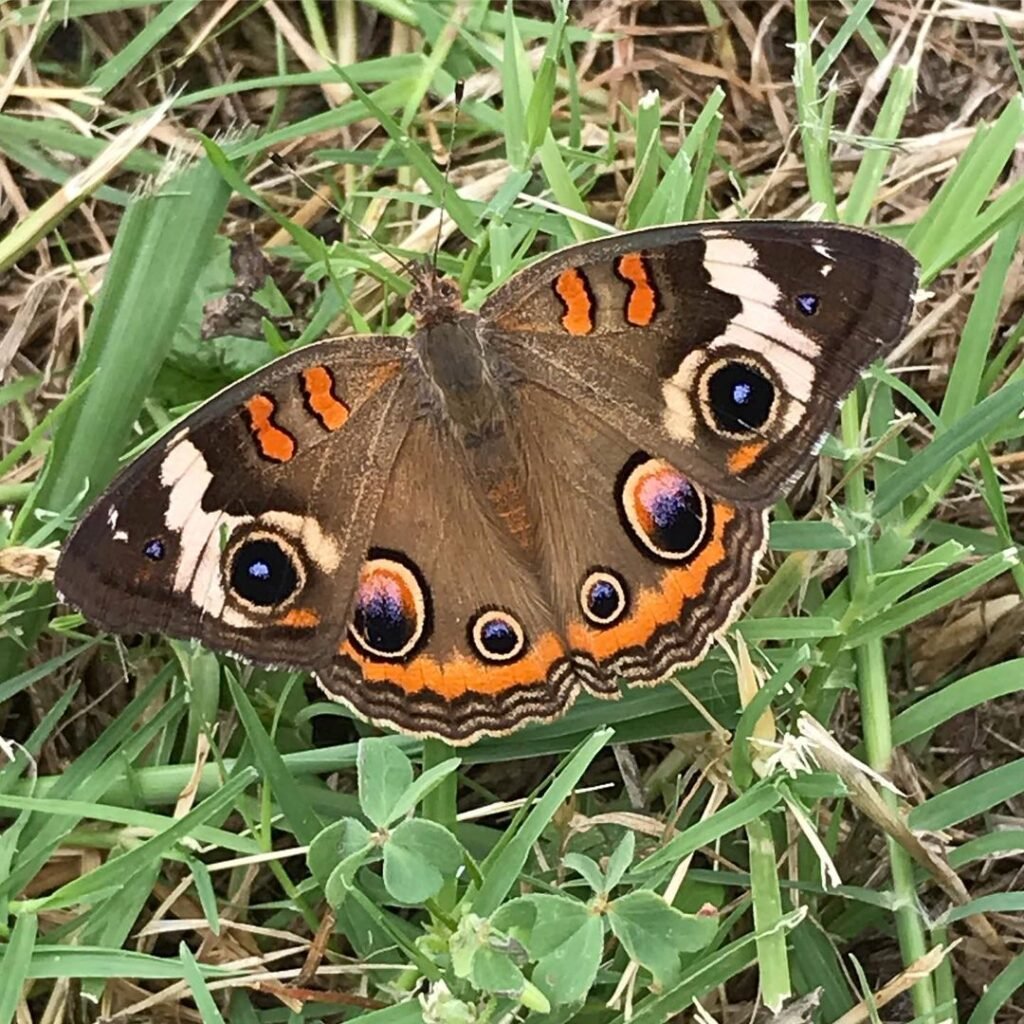
The Buckeye is a medium-sized butterflyhm that’s a member of the brushfoot family. It gets its name from the distinctive eye-like markings on its wings, which resemble the eye spots on a buck deer.
Identification
Buckeyes have brown wings with large, eye-like markings on the forewing and hindwing. The underside of their wings is a dull, mottled brown color.
Fun Fact
Buckeye caterpillars feed on various plant species, including plantains, snapdragons, and false foxgloves.
7. Gulf Fritillary

The Gulf Fritillary is a vibrant orange butterfly that’s commonly found in the southern United States, particularly along the Gulf Coast region. It’s a member of the longwing butterfly family.
Identification
Gulf Fritillaries have bright orange wings with black markings and a striking silverish-white pattern on the underside of their wings.
Fun Fact
These butterflies are strongly attracted to the passionflower plant, on which their caterpillars feed exclusively.
8. Zebra Swallowtail

The Zebra Swallowtail is a striking member of the swallowtail family. It’s a large butterfly that’s easily recognizable by its distinctive black and white striped wings.
Identification
Zebra Swallowtails have black wings with white stripes running lengthwise. They have long tails on their hindwings, a characteristic of swallowtail butterflies.
Fun Fact
Zebra Swallowtail caterpillars feed on pawpaw trees, and the adult butterflies are commonly found in wooded areas where these trees grow.
9. Spicebush Swallowtail
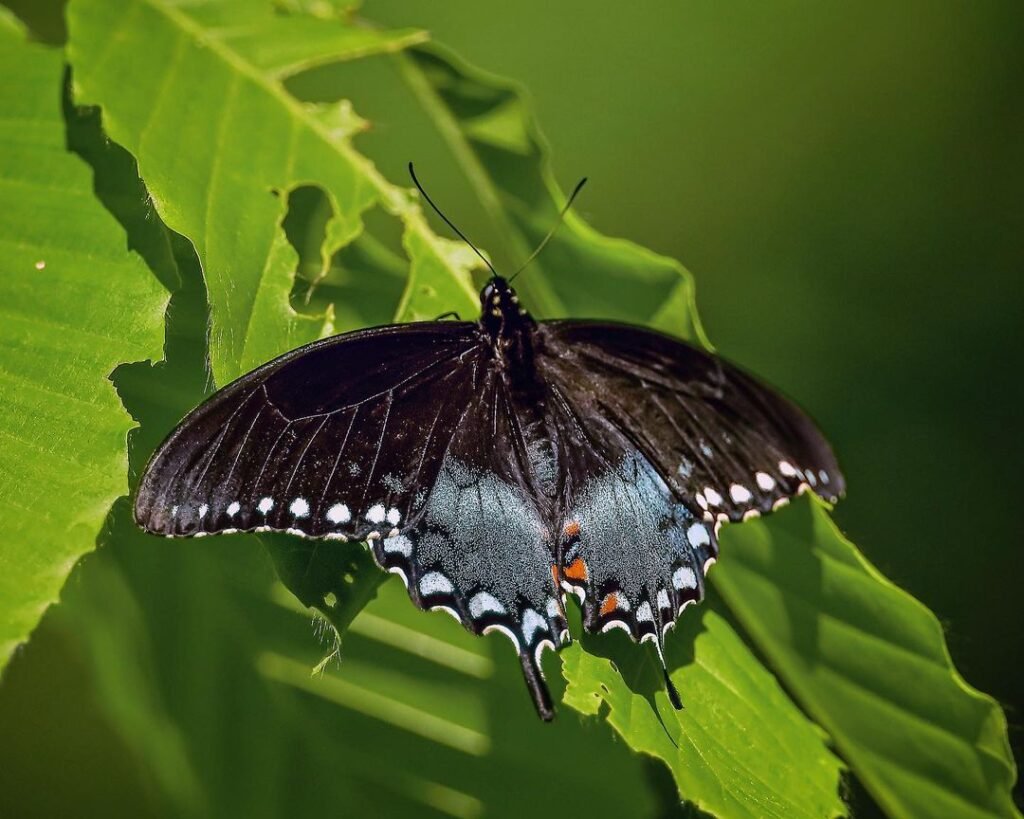
The Spicebush Swallowtail is a beautiful black butterfly with intricate blue and orange markings. It’s a member of the swallowtail family and can be found in eastern parts of the United States.
Identification
Spicebush Swallowtails have black wings with rows of blue and orange spots. Their hindwings have distinctive orange markings and a short tail.
Fun Fact
As the name suggests, the caterpillars of this species feed exclusively on spicebush plants, which give them a distinct musky scent.
10. Question Mark
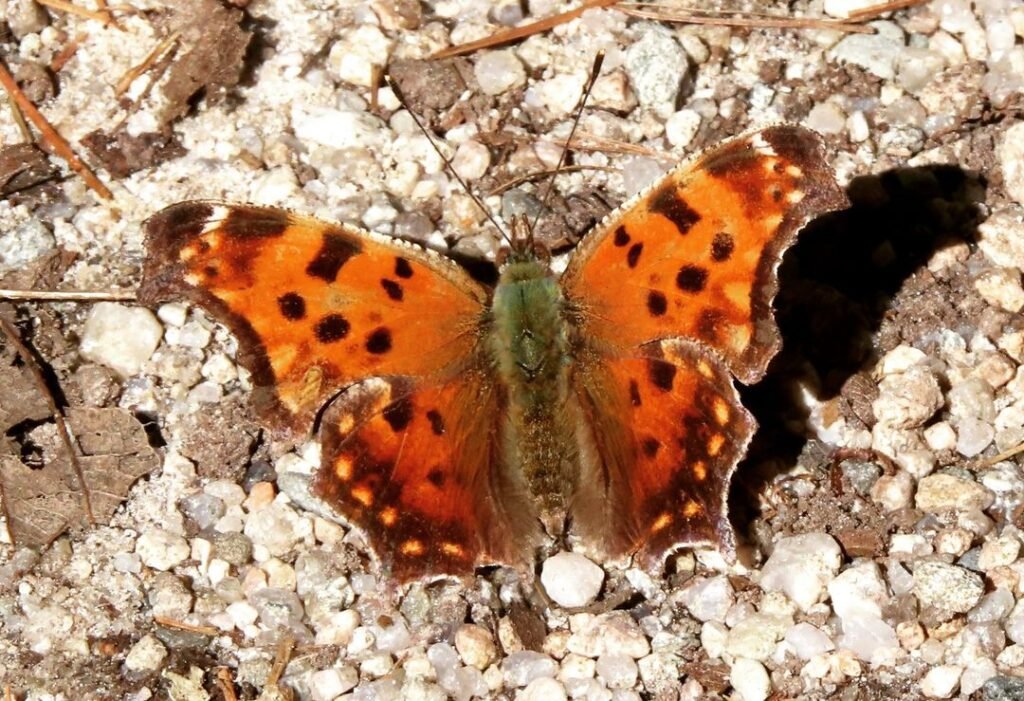
The Question Mark is a medium-sized butterfly that gets its name from the small white mark on the underside of its hindwing, which resembles a question mark.
Identification
Question Marks have reddish-orange wings with black markings on the upperside. The underside of their wings is a mottled brown color with the distinctive question mark-shaped marking.
Fun Fact
These butterflies are commonly found in wooded areas and are known for their unique behavior of congregating in large groups to overwinter.
11. Mourning Cloak
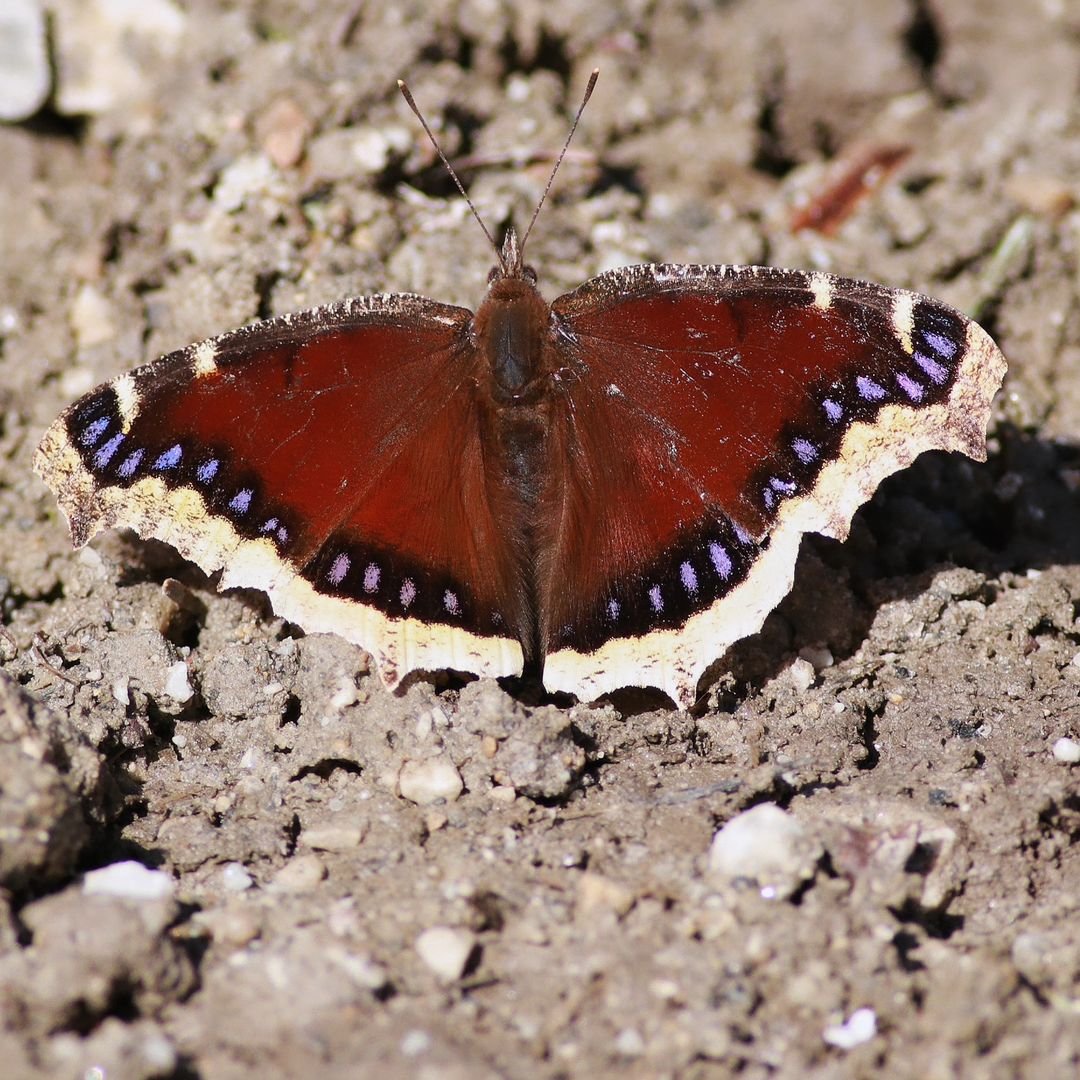
The Mourning Cloak is a striking butterfly that’s easily recognizable by its dark wings and bright yellow edges. It’s one of the few butterfly species that can survive cold winters, making it one of the first butterflies to emerge in early spring.
Identification
Mourning Cloaks have dark brown or black wings with a distinctive yellow border along the edges. The underside of their wings is a mottled brown color.
Fun Fact
These butterflies are known for their longevity, with some individuals living for up to 11 months – an impressive lifespan for a butterfly.
12. Giant Swallowtail

A close-up photo of a Giant Swallowtail butterfly with black and yellow wings, perched on a green leaf.
As the name suggests, the Giant Swallowtail is one of the largest butterfly species found in the United States. It’s a stunning yellow and black butterfly that can be found in the southeastern states.
Identification
Giant Swallowtails have large yellow wings with black stripes and a distinctive tail on their hindwings. They have a wingspan of up to 6 inches, making them truly giants in the butterfly world.
Fun Fact
The caterpillars of this species are also impressive, growing up to 2 inches long. They feed on various citrus trees and other plants in the rue family.
13. Great Spangled Fritillary

The Great Spangled Fritillary is a beautiful and distinctive butterfly found in most parts of the United States. It’s a member of the brush-footed butterfly family.
Identification
Great Spangled Fritillaries have bright orange wings with black markings and a row of creamy-white spots along the outer edges. The underside of their wings is a striking reddish-brown color with silvery spots.
Fun Fact
These butterflies are often found in open fields and meadows, where their caterpillars feed on violets and other plants in the violet family.
14. Pipevine Swallowtail

The Pipevine Swallowtail is a unique and striking butterfly that’s found in the southern and eastern United States. It’s a member of the swallowtail family and gets its name from the pipevine plant, which is the exclusive host plant for its caterpillars.
Identification
Pipevine Swallowtails have striking black wings with iridescent blue markings and a row of bright orange spots along the outer edges. They have a distinctive long tail on their hindwings.
Fun Fact
These butterflies have an interesting defense mechanism – when threatened, their caterpillars can release a foul-smelling chemical from their osmeteria (scent glands) to deter predators.
15. Cloudless Sulphur
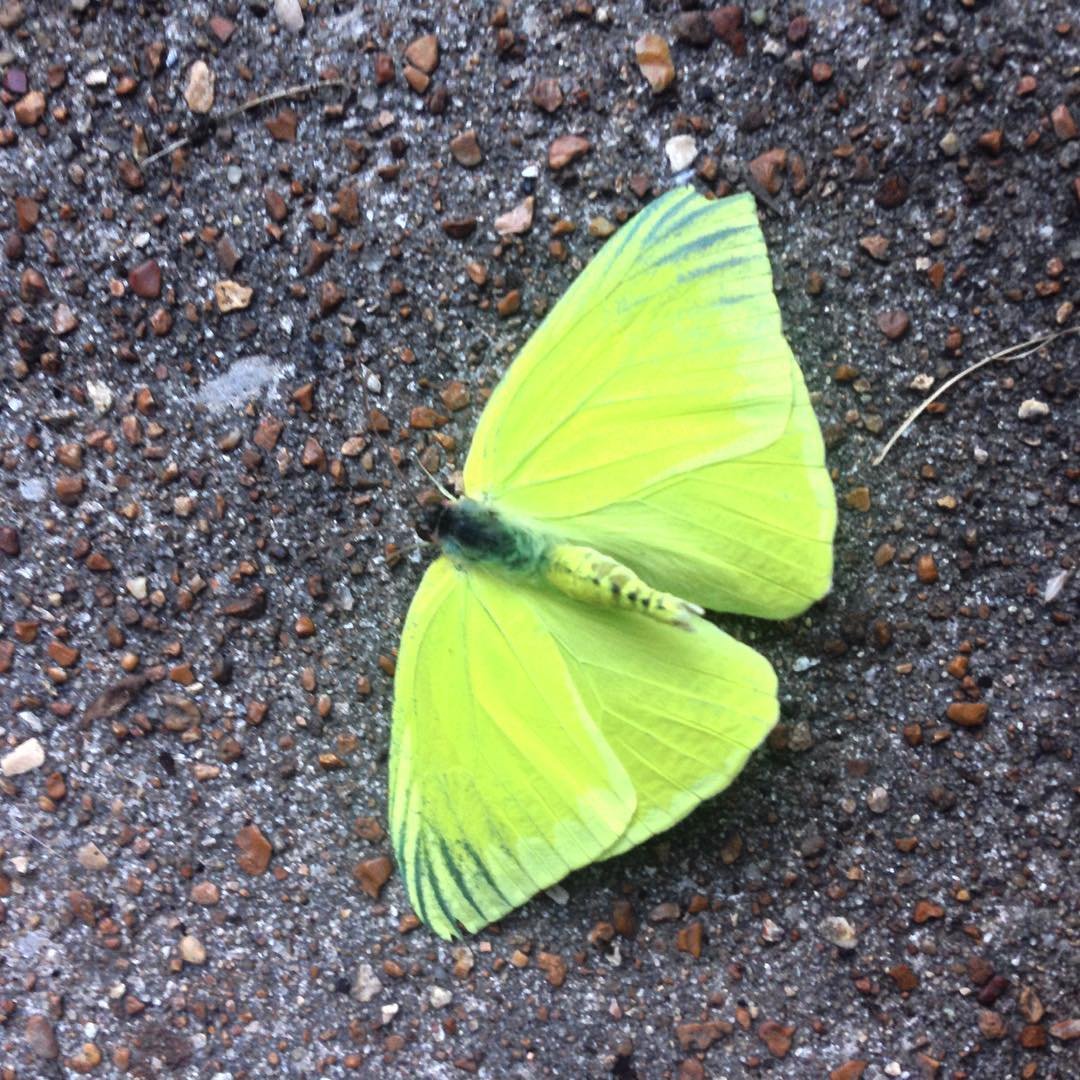
The Cloudless Sulphur is a beautiful yellow butterfly that’s commonly found in the southern United States, particularly in Florida and other Gulf Coast states.
Identification
Cloudless Sulphurs have bright yellow wings with a distinctive orange tint on the upperside. Males have a solid yellow color, while females have a pale yellow or whitish coloration.
Fun Fact
These butterflies are strong fliers and can migrate in large numbers. They’re often seen in urban areas and gardens, where their caterpillars feed on various plants in the pea family.
16. Black Swallowtail
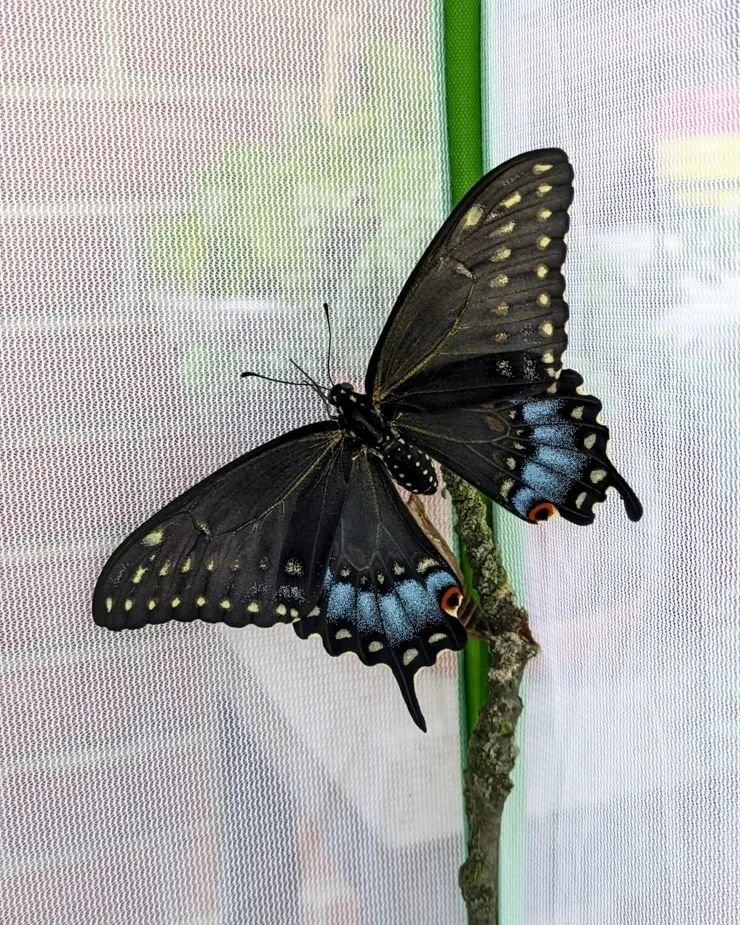
The Black Swallowtail is a striking butterfly that’s found throughout most of the United States and parts of Canada. It’s a member of the swallowtail family and is easily recognizable by its distinctive black and blue coloration.
Identification
Black Swallowtails have black wings with bands of yellow and blue markings. They have a distinctive black body with yellow spots and a distinctive tail on their hindwings.
Fun Fact
These butterflies are often seen in gardens and open areas, where their caterpillars feed on plants in the carrot family, such as dill, parsley, and fennel.
17. American Lady
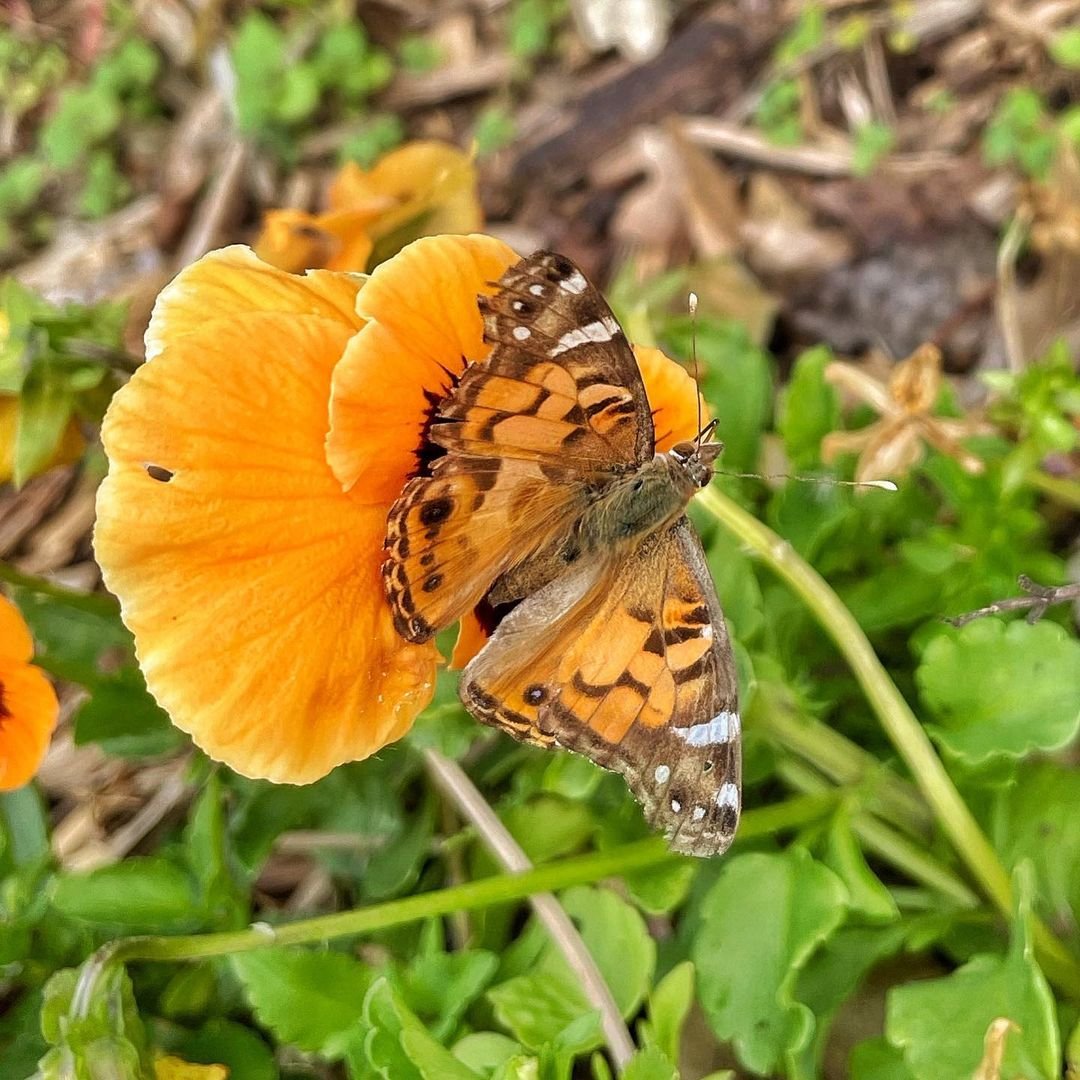
The American Lady is a beautiful orange and brown butterfly that can be found across most of the United States and parts of Canada.
Identification
American Ladies have orange wings with brown markings and white spots near the wingtips. The underside of their wings is a mottled brown color with intricate patterns.
Fun Fact
These butterflies are known for their migratory behavior, traveling hundreds of miles each year in search of suitable breeding grounds and food sources.
18. Cabbage White

The Cabbage White is a common butterfly that can be found throughout the United States and is often seen in gardens and agricultural areas.
Identification
Cabbage Whites have white wings with black tips on their forewings (males) or black spots (females). Their undersides are a pale yellow color.
Fun Fact
Despite their unassuming appearance, Cabbage White caterpillars can be major pests in vegetable gardens, feeding on plants in the cabbage family, including broccoli, kale, and cauliflower.
19. Eastern Tailed-Blue

The Eastern Tailed-Blue is a small but striking butterfly that’s found in the eastern and central United States.
Identification
Eastern Tailed-Blues have bluish-gray wings with distinctive tails on their hindwings. Males have a brighter blue coloration, while females are more grayish-brown.
Fun Fact
These tiny butterflies are often found in open fields, meadows, and gardens, where their caterpillars feed on various legumes and flowering plants.
20. Variegated Fritillary

The Variegated Fritillary is a beautiful and distinctive butterfly found in parts of the central and western United States.
Identification
Variegated Fritillaries have orange wings with black markings and a striking pattern of cream-colored spots along the outer edges. The underside of their wings is a mottled brown color with silvery spots.
Fun Fact
These butterflies are often found in prairies, meadows, and open woodlands, where their caterpillars feed on violets and other plants in the violet family.
21. Checkered White

The Checkered White is a small but eye-catching butterfly that can be found throughout much of the United States and parts of Canada.
Identification
Checkered Whites have white wings with distinctive black markings that resemble a checkerboard pattern. The undersides of their wings are a pale yellow color with black markings.
Fun Fact
These butterflies are commonly seen in gardens and urban areas, where their caterpillars feed on various plants in the mustard family, including broccoli, cabbage, and mustard greens.
22. Gray Hairstreak

The Gray Hairstreak is a small, delicate butterfly that can be found in various parts of the United States and southern Canada.
Identification
Gray Hairstreaks have gray wings with a distinctive hairstreak or thin, white line running along the undersides of their wings. Their wings also have faint orange spots near the hindwing tails.
Fun Fact
These butterflies are often found in open woodlands and forest edges, where their caterpillars feed on various plants, including oak trees, hickories, and other woody plants.
23. Hackberry Emperor
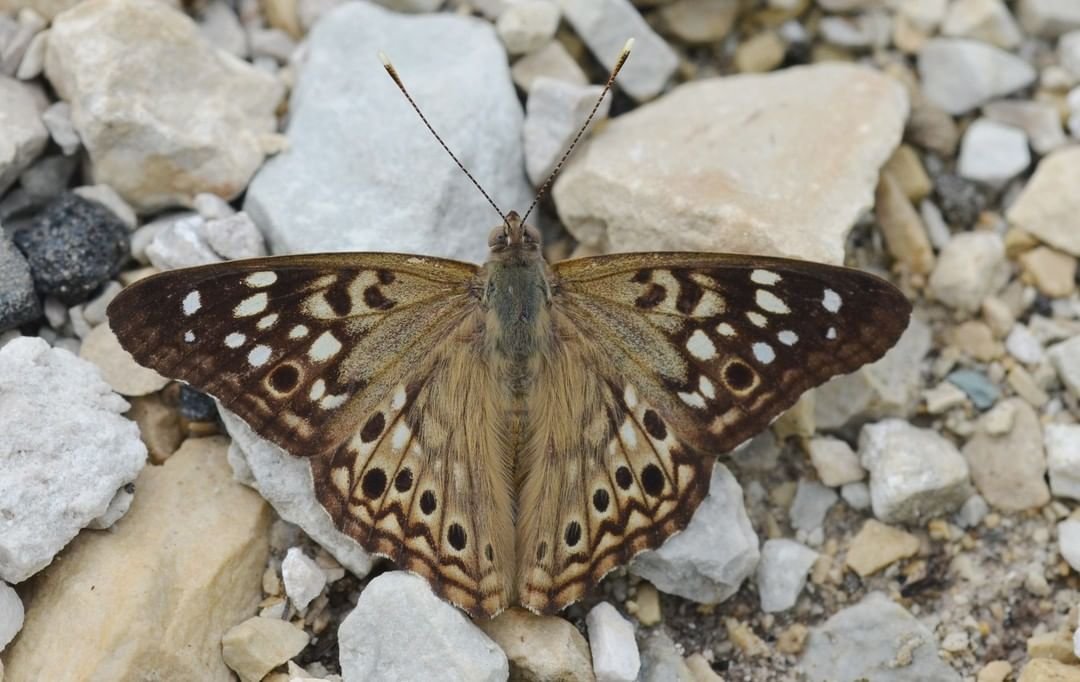
The Hackberry Emperor is a large and striking butterfly that can be found in the central and eastern United States.
Identification
Hackberry Emperors have brown wings with a distinctive purple-blue iridescent sheen. Their wings also have white spots and markings, particularly along the outer edges.
Fun Fact
As their name suggests, these butterflies are closely associated with hackberry trees, which serve as the host plant for their caterpillars. They’re often found in urban areas and parks where hackberry trees grow.
24. Goatweed Leafwing
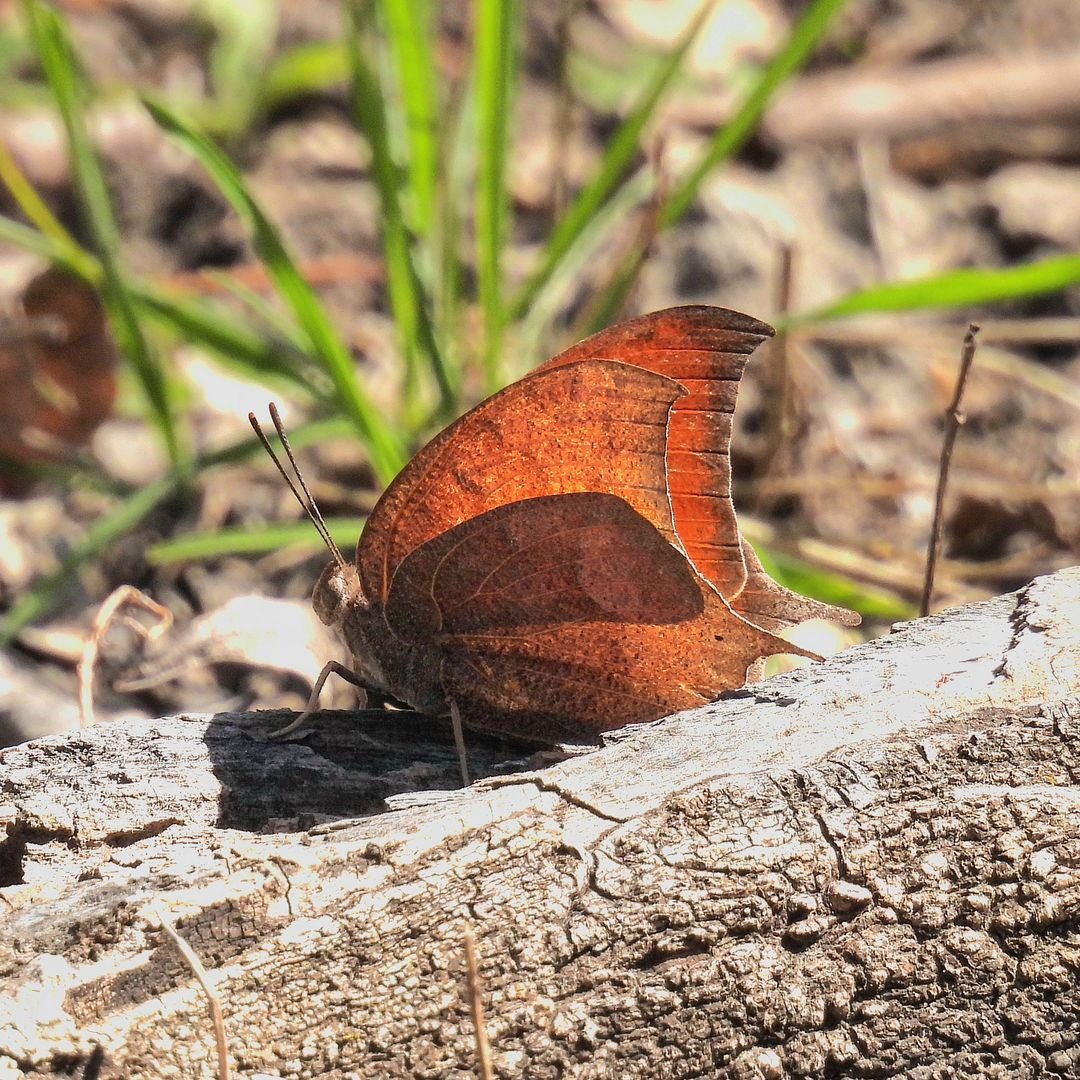
The Goatweed Leafwing is a unique and well-camouflaged butterfly found in parts of the southeastern United States.
Identification
Goatweed Leafwings have brown wings with intricate patterns that help them blend in with dead leaves and twigs. When their wings are closed, they resemble a dead leaf, providing excellent camouflage.
Fun Fact
These butterflies get their name from the goatweed plant, which is the exclusive host plant for their caterpillars. The caterpillars also have remarkable camouflage, resembling bird droppings.
25. Sachem
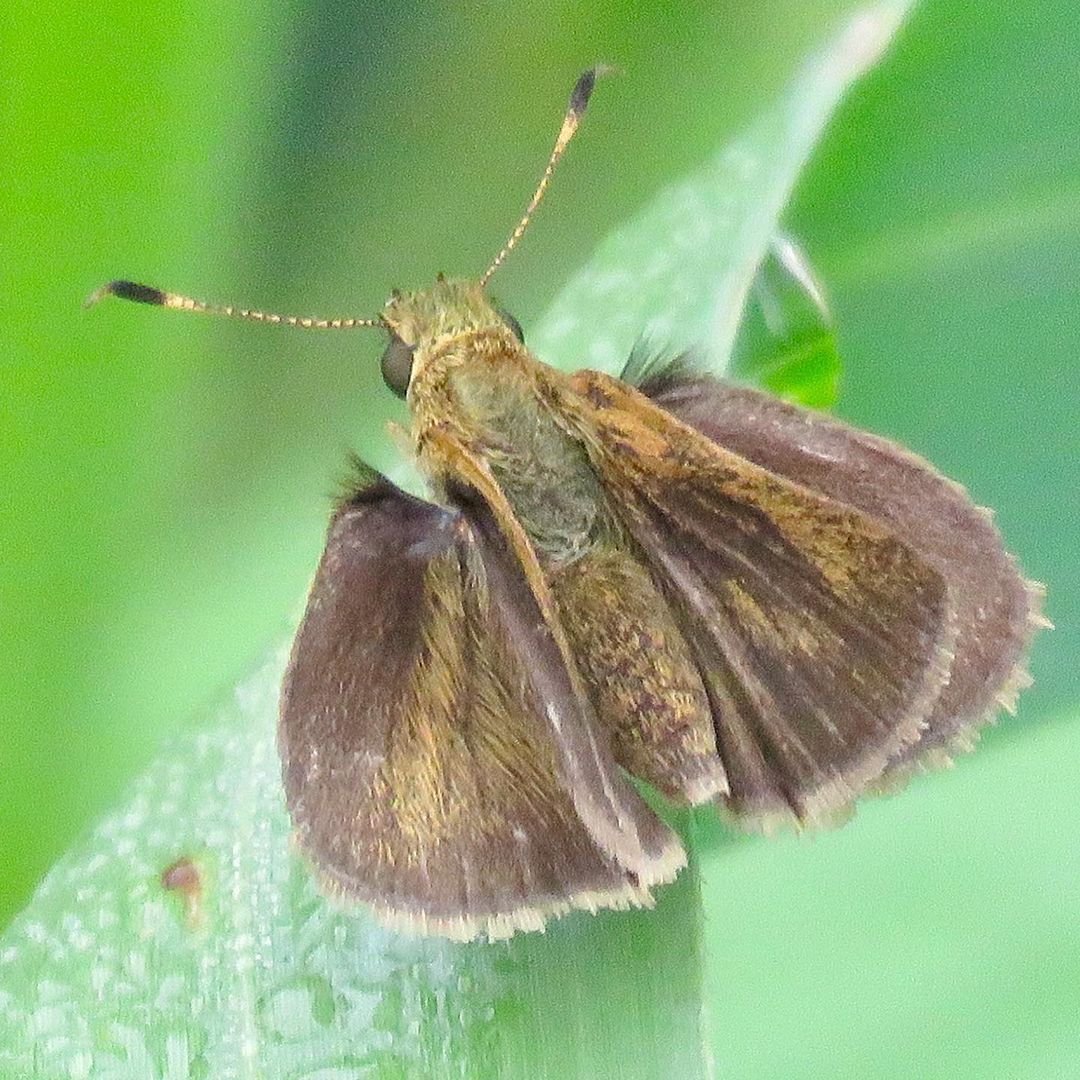
The Sachem is a beautiful and striking butterfly found in various parts of the United States and southern Canada.
Identification
Sachems have black wings with bright orange markings and a row of cream-colored spots along the outer edges. The undersides of their wings are a mottled brown color with intricate patterns.
Fun Fact
These butterflies are often found in open woodlands, fields, and meadows, where their caterpillars feed on various plants, including snapdragons, plantains, and false foxgloves.
26. Fiery Skipper

The Fiery Skipper is a small but vibrant butterfly that can be found in parts of the eastern and central United States.
Identification
Fiery Skippers have orange wings with black markings and a distinctive yellow patch on the hindwings. Their undersides are a mottled brown color with intricate patterns.
Fun Fact
Despite their small size, these butterflies are strong fliers and are often seen visiting flowers in gardens and open areas. Their caterpillars feed on various grasses and sedges.
27. Sleepy Orange

The Sleepy Orange is a beautiful and aptly named butterfly found in parts of the southwestern United States and Mexico.
Identification
Sleepy Oranges have bright orange wings with dark brown markings and a distinctive eye-spot on the hindwings. The undersides of their wings are a mottled brown color.
Fun Fact
These butterflies get their name from their tendency to bask in the sun with their wings open, appearing to “sleep” while warming themselves. They’re often found in deserts and arid areas, where their caterpillars feed on various plants.
28. Weidemeyer’s Admiral

Weidemeyer’s Admiral is a striking and rare butterfly found in parts of the southwestern United States and Mexico.
Identification
Weidemeyer’s Admirals have black wings with distinctive white bands and orange markings. The undersides of their wings are a mottled brown color with intricate patterns.
Fun Fact
These butterflies are closely associated with oak trees, which serve as the host plant for their caterpillars. Due to habitat loss and other factors, Weidemeyer’s Admiral is considered a species of conservation concern in some areas.
29. Sara Orangetip

The Sara Orangetip is a delicate and beautiful butterfly found in parts of the western United States and Canada.
Identification
Sara Orangetips have white wings with distinctive orange tips on the forewings (males) or black spots (females). The undersides of their wings are a pale green color.
Fun Fact
These butterflies are often found in open areas, meadows, and woodlands, where their caterpillars feed on various plants in the mustard family, including rockcress and bittercress.
Observing and Appreciating Butterflies
Observing and appreciating butterflies is a wonderful way to connect with nature and appreciate the incredible diversity of life on our planet. Whether you’re an avid butterfly enthusiast or someone who simply enjoys spotting these winged wonders in your backyard or local park, we hope this guide has provided you with valuable information to identify and learn more about the beautiful butterflies that call the United States home.
Remember, protecting and preserving butterfly habitats is crucial for ensuring the survival of these magnificent creatures. You can help by planting native flowers and avoiding pesticides in your garden, supporting conservation efforts, and spreading awareness about the importance of butterfly conservation.
Happy butterfly watching!
Pingback: Discover the Majestic White Oak Tree: A Comprehensive Guide -
Pingback: 25 Stunning Terrarium Plants to Liven Up Your Home -
Pingback: 15 Black and Orange Caterpillars (With Pictures) -
Pingback: Caterpillars in California: Exploring the Diverse World
Pingback: How to Grow and Care for Peace Lily Plants: A Complete Guide
Pingback: How to Grow and Care for Turtlehead Plants Gardeners Schools
Pingback: 26 Stunning Moths That Look Like Butterflies
Pingback: How To Grow and Care For Honeysuckle – A Fragrant Guide
Pingback: Hibiscus Flower: The Ultimate Guide to Growing and Caring
Pingback: Flowering Tobacco : Essential Care Tips for Lush Blooms
Pingback: Caterpillars: Identification, Damag and Control Methods - Gardener's School
Pingback: How to Grow Snapdragons : A Comprehensive Guide for Vibrant Blooms
Pingback: How to Create a Butterfly Garden Oasis - Gardener's School
Pingback: Purple Wildflowers : Nature’s Vibrant Beauties -